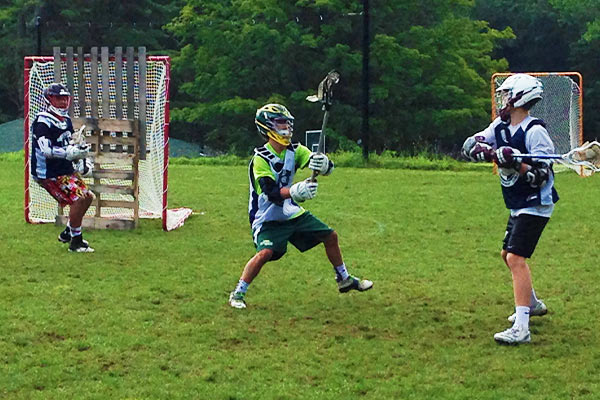2 Tips to Help You Improve as a Lacrosse Player

We spend a lot of time working on the physical part of being a better lacrosse player at all of our GameBreaker Lacrosse Camp locations across the country, but that’s not all we focus on during our time with campers each summer. A great example is at our Massachusetts Lacrosse Camps – while our camp directors and coaches focus on helping players improve on the field, they also make sure to talk about the other details that go into being a great lacrosse player.
This includes getting a greater understanding of team play and learning the concepts to help make their team better overall. Of course, this also helps build up a player’s leadership skills. That’s important because while one of the more common phrases we hear in sports is “He/She is a natural-born leader,” that’s actually not the case. Some players may have the type of personality that would make a great leader, but those abilities need to be nurtured into actually becoming a great leader – both on and off the field.
Like most things in sports, it’s the smallest of tweaks and smallest of details that ends up making a huge difference. It’s easy to see and consider those things in the offseason, but it can also be difficult to keep an eye on those details in the middle of a lacrosse season, which can be a grind for just about anyone. That’s why we’re here to remind you about some!
Here are two simple tips that can help anyone – whether you’re a beginner or a recruited college athlete – take their lax game to the next level.
2 Lacrosse Training Tips
The Value of Proper Communication
Even if you already feel like you’re a great communicator with your teammates on and off the field, there is always room for improvement, even if it’s just being more consistent in certain situations. Your lax team is depending on you to be on top of your game from a personal level, but let’s not forget that this is a team sport. The longer you all can work as a unit during a game, the better.
The old adage out there is that you practice how you play, and it rings true for this. Practice communicating a ton with your teammates throughout practice, and soon enough, it’ll just be second nature during games, and you won’t even have to think about it.
Not Taking Things Personally
There are a number of ways we can talk about this. For today, though, we want to focus on the player-coach relationship. Coaches always have to toe the line of being liked by the players, but not to the point where those players don’t see them as a voice of authority.
Regardless of how much you like your coach, there are going to be times where they’ll either remind you of things or critique you in a way that annoys you. Don’t forget that they have your best interests in mind and want to see you succeed just as much as anyone else, so take what they say in stride and don’t let it impact other parts of your relationship.



